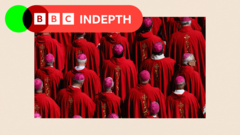The Vatican's Santa Marta guesthouse, hosting cardinals in preparation for the upcoming conclave set to begin on May 7, carries the weight of its past occupant who passed away on Easter Monday. While the room remains sealed with a red ribbon until a new Pope is elected, it serves as a powerful symbol reflecting the legacy of Pope Francis, whose approach transformed many traditional facets of the Catholic Church. During his 12-year papacy, he appointed around 80% of the cardinals who will elect his successor, making their decisions particularly significant.
As the cardinals gather, discussions frequently revolve around Pope Francis's pivotal reforms—shifting the Church's focus from a hierarchical structure to including the perspectives of the laity, especially the impoverished and marginalized. However, opinions on how his legacy should be honored vary widely. Although many cardinals express a desire to continue his work, skeptics worry that some of his initiatives did not resonate universally.
This conclave marks a milestone in terms of representation within the Church since it is the most diverse group of cardinals in history, with representatives from countries such as South Sudan, Papua New Guinea, and Rwanda, indicating a global shift in priorities. The pre-conclave meetings have illuminated differing challenges across regions; while Europe faces declining attendance and relevance, critical social issues like poverty and conflict remain in focus for many in Africa and Asia.
The new Pope's profile must consider not only spiritual leadership but also his ability to navigate the Vatican's status as a global state with substantial influence. Chris Trott, British ambassador to the Holy See, emphasizes how the Vatican engages broadly on world issues, highlighting the unique challenges each Pope faces due to their predecessor’s frameworks.
While discussions have surfaced regarding the role of the new Pope as an administrator capable of rectifying issues of sexual abuse and financial irregularities, there is a consensus that clarity in the Church's direction, especially regarding reforms advocated by Pope Francis, is essential. Many are eager for a leader who can articulate a cohesive vision for its future, especially in terms of inclusivity for women and LGBTQ+ individuals.
A divide persists between supporters of Pope Francis's progressive vision and traditionalists who argue he diverged from fundamental Church teachings. The ongoing dialogues, particularly in pre-conclave gatherings, reflect the potential for a power struggle as some cardinals aired their grievances about the Pope's approach.
As cardinals prepare for their votes in the Sistine Chapel, underlying tensions may influence the selection process. Despite uncertainties, there seems to be a yearning for unity and continuity in carrying forward the ethos championed by Pope Francis during his papacy, notably a compassionate outreach to those marginalized across the globe. As they prepare to cast their ballots, the cardinals will undoubtedly be moved by a sense of divine guidance amidst the complexities of their decisions.
As the cardinals gather, discussions frequently revolve around Pope Francis's pivotal reforms—shifting the Church's focus from a hierarchical structure to including the perspectives of the laity, especially the impoverished and marginalized. However, opinions on how his legacy should be honored vary widely. Although many cardinals express a desire to continue his work, skeptics worry that some of his initiatives did not resonate universally.
This conclave marks a milestone in terms of representation within the Church since it is the most diverse group of cardinals in history, with representatives from countries such as South Sudan, Papua New Guinea, and Rwanda, indicating a global shift in priorities. The pre-conclave meetings have illuminated differing challenges across regions; while Europe faces declining attendance and relevance, critical social issues like poverty and conflict remain in focus for many in Africa and Asia.
The new Pope's profile must consider not only spiritual leadership but also his ability to navigate the Vatican's status as a global state with substantial influence. Chris Trott, British ambassador to the Holy See, emphasizes how the Vatican engages broadly on world issues, highlighting the unique challenges each Pope faces due to their predecessor’s frameworks.
While discussions have surfaced regarding the role of the new Pope as an administrator capable of rectifying issues of sexual abuse and financial irregularities, there is a consensus that clarity in the Church's direction, especially regarding reforms advocated by Pope Francis, is essential. Many are eager for a leader who can articulate a cohesive vision for its future, especially in terms of inclusivity for women and LGBTQ+ individuals.
A divide persists between supporters of Pope Francis's progressive vision and traditionalists who argue he diverged from fundamental Church teachings. The ongoing dialogues, particularly in pre-conclave gatherings, reflect the potential for a power struggle as some cardinals aired their grievances about the Pope's approach.
As cardinals prepare for their votes in the Sistine Chapel, underlying tensions may influence the selection process. Despite uncertainties, there seems to be a yearning for unity and continuity in carrying forward the ethos championed by Pope Francis during his papacy, notably a compassionate outreach to those marginalized across the globe. As they prepare to cast their ballots, the cardinals will undoubtedly be moved by a sense of divine guidance amidst the complexities of their decisions.




















